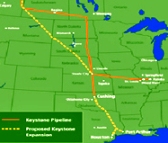TransCanada wins final permit to build Gulf leg of Keystone XL pipeline
TransCanada Corp. said Friday it received the final of three key permits from the US Army Corps of Engineers in order to advance the 485-mile Gulf Coast leg of its proposed Keystone XL oil pipeline system.
With the permit from the Fort Worth, Texas, Army Corps district added to previously-received permits from districts in Galveston, Texas, and the Tulsa, Oklahoma, TransCanada says it can now start construction of the oil pipeline in the coming weeks.
 “Receiving this final, key Army Corps permit for the Gulf Coast project is very positive news,” said Russ Girling, TransCanada CEO.
“Receiving this final, key Army Corps permit for the Gulf Coast project is very positive news,” said Russ Girling, TransCanada CEO.
“TransCanada is now poised to put approximately 4,000 Americans to work constructing the US$2.3-billion pipeline that will be built in three distinct 'spreads' or sections,” he added.
The pipeline will transport growing supplies of US crude oil to meet refinery demand in Texas, according to the company.
Gulf Coast refineries will be able to access lower-cost domestic production and avoid paying a premium to foreign oil producers, reducing cost and US dependence on foreign crude oil, TransCanada says.
Girling said building a safe and reliable pipeline remains TransCanada's priority.
“TransCanada has an industry-leading safety record and that is something we take great pride in,” he said. “As an industry, we need to have the best and most modern policies, procedures and equipment in place to prevent and respond to incidents.”
The US Department of State continues to review TransCanada's application for a Presidential Permit to proceed with the 1,179-mile Keystone XL pipeline from Hardisty, Alberta, to Steele City, Nebraska, and is expected to make a decision in the first quarter of 2013, the company said.
TransCanada also continues to work with the Nebraska Department of Environmental Quality to finalize a route that avoids the environmentally-sensitive Sandhills area of Nebraska.
“The Gulf Coast project and the entire Keystone system will further help the US achieve true energy security,” said Girling.
“The US Energy Information Administration has forecast the United States will continue to import more than seven million barrels of oil each day into 2035,” he continued.
“I continue to believe Americans would prefer to consume their crude oil from domestic producers and from Canada rather than higher-priced oil from countries that do not share American values.”
For full details on the current status of Keystone XL, including safety procedures for the pipeline, read TransCanada’s news release by clicking here.






Comments